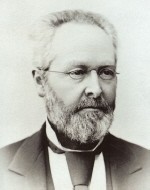Basil Manly, Jr.
Basil Manly, Jr., professor of Old Testament from 1859-1871 and 1879-1892, was born on December 19, 1825 in Edgefield County, South Carolina to Basil and Sarah Manly. In 1837, Manly’s father, a prominent Baptist pastor, assumed the presidency of the University of Alabama in Tuscaloosa. Manly, Jr. later attended the school and graduated first in his class. Manly then studied for a year at Newton Theological Seminary in Massachusetts before enrolling in Princeton Theological Seminary. He graduated in 1847.
Ordained in 1848, Manly accepted the pastoral charge of three churches, two in Alabama and one in Mississippi. He resigned the churches after one year and considerable strain to his health. While he recovered, Manly edited the Baptist Psalmody with his father. After more pastoral labor and denominational service, Manly began what he considered his life’s great work in 1859 when he joined Southern’s faculty. A long-time proponent of a Southern theological school for Baptists, Manly specialized in Old Testament and opposed higher criticism. He taught additional classes in biblical introduction and Hebrew and occasionally added Assyrian, homiletics, and polemics to his plate.
Manly left the Seminary in 1871 when Georgetown College called him as its president. Eight years later, he rejoined his colleagues on the faculty in place of departed professor C. H. Toy. A gifted writer, Manly supplied Southern with the Seminary Hymn for the first commencement in 1860. The seminary community has sung it at every commencement since. Manly also wrote the seminary’s official confession of faith, the Abstract of Principles, an eloquent statement of essential scriptural doctrine. His only book, The Bible Doctrine of Inspiration, functioned as the faculty’s response to the Toy controversy. A man of “great versatility and varied attainments, strong in will as he was gentle in spirit,” Manly taught until his death on January 31, 1892. (1)
(1) John Broadus, Memoir of James P. Boyce, 203
Any historical record of the founders of the Southern Baptist Convention, and The Southern Baptist Theological Seminary, is incomplete without an honest telling of their complicity in American slavery and racism. For more on that story, read here.

